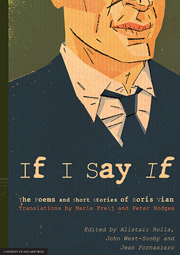Book contents
- Frontmatter
- Contents
- Foreword
- Boris Vian: A Life in Paradox
- Note on the Texts
- Part I The Poetry of Boris Vian
- Rereading Vian: A Poetics of Partial Disclosure
- Part II The Short Stories of Boris Vian
- Part III On Translating Boris Vian
- Notes to the Poems
- Notes to the Short Stories
- Bibliography of Works Cited
Rereading Vian: A Poetics of Partial Disclosure
from Part I - The Poetry of Boris Vian
Published online by Cambridge University Press: 05 September 2014
- Frontmatter
- Contents
- Foreword
- Boris Vian: A Life in Paradox
- Note on the Texts
- Part I The Poetry of Boris Vian
- Rereading Vian: A Poetics of Partial Disclosure
- Part II The Short Stories of Boris Vian
- Part III On Translating Boris Vian
- Notes to the Poems
- Notes to the Short Stories
- Bibliography of Works Cited
Summary
Periodically a call is issued from academic circles to reread the works of Boris Vian, whose name has become synonymous both with the exuberance of youth and the haunting menace of death. This call to reread Boris Vian is due in no small part to the way in which his untimely and yet long foreseen death has singularly failed to curb his joie de vivre. To say that Vian was born again in death is, however, something of a misrepresentation: as an author, his success, in his own name at least, has been almost entirely posthumous. As a man, working without respite to assuage an overweening drive to create, and thereby consigning himself to an even earlier death than might otherwise have been his lot, and as an author, determined to “coincide” with his published works, Vian exemplifies the conflation of Eros and Thanatos. Our aim here is to reread the interplay of these two apparently mutually exclusive drives in the poems most commonly known by the title under which they were originally, and — as so often in Vian's case — posthumously, published: Je voudrais pas crever (I wouldn't wanna die). In so doing, it is our wish to offer a critical accompaniment to Maria Freij's translations, thereby presenting readers with the various aspects of rereading that form the basis of Vian scholarship.
- Type
- Chapter
- Information
- If I Say IfThe Poems and Short Stories of Boris Vian, pp. 47 - 62Publisher: The University of Adelaide PressPrint publication year: 2014



